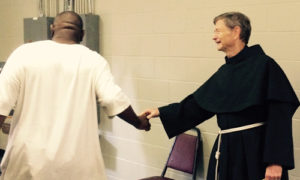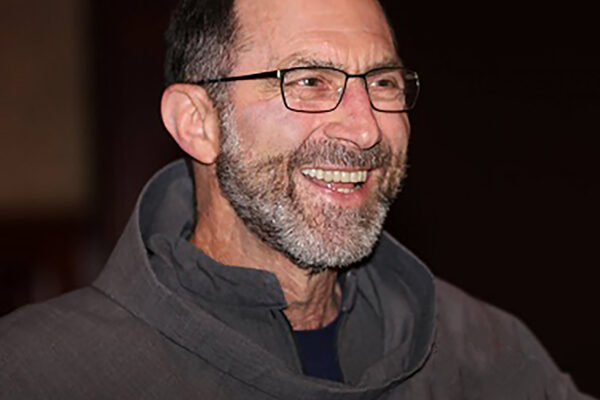At our parishes and retreat centers, and even in more casual conversations, we hear this question frequently. In the letters and email we receive asking for prayers, this is the number one request. And it isn’t just about high school kids – people are worried about their adult children as well.
Friar Jude Winkler has some advice for parents (and grandparents) whose kids have drifted away from the Catholic faith. He also has something to say to the younger people themselves. Friar Jude is a scholar and author of many books, and is able to break down the complexities of theology to a simple fact: God loves us.
Why have people, especially the young, stopped going to Church? Where do they find the community that faith once provided? Friar Jim Kent OFM Conv. suggests that where we focus our attention and how we spend our time and money show what is most important in our lives. He talks about how today business and entertainment dominate our skylines, and sometimes our lives. Getting people back to Church can be a matter of example first, showing the Joy of the Gospel, then inviting people back.
Fr. Tom Merrill
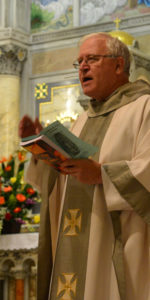 Studying Theology at the Washington Theological Union back in the 1970’s, I was very much influenced by the two Augustinian Professors I had for Foundational Theology, which deals with the existence of God and our need for Him, Christian Anthropology which is based on the fundamental human need for God and His irresistible grace, and finally, Christology, the study of Jesus Christ, the point of union between us and God, and finally, Eschatology, where a joyful and fulfilled life necessarily comes about through experiences of God on a daily basis. In a nutshell, St. Augustine’s two classic phrases, sum up what I firmly believe is the ultimate search for meaning in everyone’s life: “You have made us for yourself, o Lord, and our hearts are restless until they rest in You”, and, “I would not be searching for You, o Lord, unless I had already found You, and I would not have found You if I had not already been searching for You.”
Studying Theology at the Washington Theological Union back in the 1970’s, I was very much influenced by the two Augustinian Professors I had for Foundational Theology, which deals with the existence of God and our need for Him, Christian Anthropology which is based on the fundamental human need for God and His irresistible grace, and finally, Christology, the study of Jesus Christ, the point of union between us and God, and finally, Eschatology, where a joyful and fulfilled life necessarily comes about through experiences of God on a daily basis. In a nutshell, St. Augustine’s two classic phrases, sum up what I firmly believe is the ultimate search for meaning in everyone’s life: “You have made us for yourself, o Lord, and our hearts are restless until they rest in You”, and, “I would not be searching for You, o Lord, unless I had already found You, and I would not have found You if I had not already been searching for You.”
The starting point for parents whose teens and adult children have stopped going to church need to be here: Whether they know it or not, we are all searching for God, and God searches for us. I would encourage parents to share how their own search for God and His gift of faith have made a difference in their lives. They might invite their children to share a personal example from their own lives when they were younger when they really felt close to God and why. After their children have shared their experiences, have the parents ask them if they still think about God and reach out to Him.
A good point of departure for encouraging teens and millennials and older adults to return to church is to emphasize that our deepest needs can never be addressed through technology, but direct human communication. Technology is only a tool or a means, not the end of forming relationships. Would they not admit that when they really need someone to listen to them they would prefer to talk with someone face to face instead of a “friend” on Face Book? Hopefully, parents can help their children own and appreciate their own experiences or those of others known to them that helped them bond with others and with God. Faith in God and Human relationships are not meant to be kept to oneself, but shared with others, especially in a common expression of faith in worship of God.
—————————–
Fr. Charles McCarthy
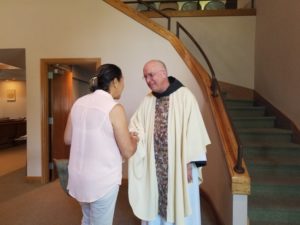 “My children don’t go to Mass. What can I do?” Why would they? “Go to Mass” can be like “Go to the dentist,” “Go to school,” “Go to bed.”
“My children don’t go to Mass. What can I do?” Why would they? “Go to Mass” can be like “Go to the dentist,” “Go to school,” “Go to bed.”
Identity in faith life needs to be more than a “Go to…” We all seek and need purpose, respect and to feel valued. Going to a static and often anonymous “place” is not where that sense of engagement and acceptance is found.
The disconnect which I perceive is in the lack of engagement between “church” and “Church.” Going to Mass needs to be connected with feeling welcomed and being part of whatever the “place” is.
I had two grandmothers. One was not much interested in seeing us or hearing us. Even when we went to visit, we’d say hi, and then be put outside so as not to mess the place up and disturb the quiet. The other grandmother was an “earth-mother”!! She couldn’t get enough of us. We couldn’t get enough of her. She traveled with us – an adult with five children in the back seat of a ford sedan. I’m sure she came out bruised, but kept us counting cows and green cars on the road. “Going to Oak Lawn” meant going to grandma’s house. YES! “Going to Chicago” was also “going to grandma’s!” “Do we have to.”
There is no magic potion or special blessing to “get someone” to “go to Mass.” Or “to church.” Rather, how do we “engage” each other in the “mission” of “the church” or “the parish?” How do we, as adults, create a sense of respect of opinion and growth in values in the community with which we worship? That becomes a question that is tackled differently in each Christian community. “A place” won’t be much of an interest. “An acceptance” will draw life and energy.
A Liturgy, or “Mass” is life giving and attractive when the people gathered there begin to be less anonymous to one another. When we invest our lives in the life of a place that invests its life in us, then we grow together. “I want to go!” “I need to go!” are statements of connection. “I don’t want to go” is a disconnect. What’s my engagement?
—————————————-
Fr. John Pozhathuparambil
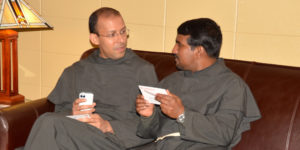
Friars John Pozhathuparambil and Tony Vattaparambil prepare for a young adult retreat at Franciscan Retreats and Spirituality Center in Prior Lake, MN.
Do not judge them for not going for Mass; that is my biggest advice for parents and grandparents who have young and young-adult children. Pray for them and accompany them as a friend. I know it is challenging. If you become too much of an authority figure, you may lose them. Be a friend who hears them, understands them and cares for them.
They (millennials) like to hear reasons, reasons why we go to Mass. Once you get to them through your friendship, tell them the reasons why they should go to Mass. Once you can convince them by words and BY YOUR LIFE the benefit of going to Mass, you will surely win them over.
—————————-
Fr. Christian Moore
This is a distressing challenge for all of us, not just for parents and grandparents. When someone says he’s spiritual but not religious it means he’s going it alone, without a connection to a faith community for support. It leads to isolation and can lead further to other problems. It’s hard to tell a person that isolation can lead to trouble like drugs and alcoholism, and even suicide in the worst cases.
Growing up in Catholic ‘ghettos,’ people all believed the same thing. We all went to Church more not to go to hell than to try to get to Heaven. Communities have changed, they’re more mixed, and we don’t teach, or really believe that you will go to hell if you don’t go to Mass.
Being a Catholic Christian takes discipline, but there isn’t a hunger for God that makes people want to take that on. We need to show them somehow that true happiness comes from a willingness to endure the effort, sometimes the pain, of making our lives better — the discipline of prayer, exercise, a good diet. It all goes together.
Spiritual things can seem unappealing until you do them and see how your life is getting better. The things that seem very appealing at first can lead in the other direction.
I believe that we have to trust that God is involved in all things. God wants us to be the best version of ourselves, and Church is a part of all that: developing a deeper relationship with God in prayer and community. We need to invite young people to be a part of that, encouraging them to embrace God, to want to go to Heaven rather than telling them to fear hell.
———————————-
Fr. Tony Vattaparambil
My first expression, perhaps like any other pastor, is “we shall pray for him/ her together.” And I would also say, God hears the cry of the parents for their children. The best example is that of St. Monica and St. Augustine. For 3o some years Monica prayed for her ‘intelligent’ son. She never gave up and God answered her tears.
Parents, please value your faith and practice it. Let your children see your devotions and other faith expressions. Definitely those expressions will work well later in their life.
Pastors and parents have to work hand in hand to engage our young adults in the social activities of the faith community/ parish. Let them feel comfortable in being at our sacred space. Let them understand themselves that the faith we profess inside our churches has also has an extension outside by reaching out to the needy. Let our young ones know that prayers inside the church and their social engagement are the two sides of the same coin.


